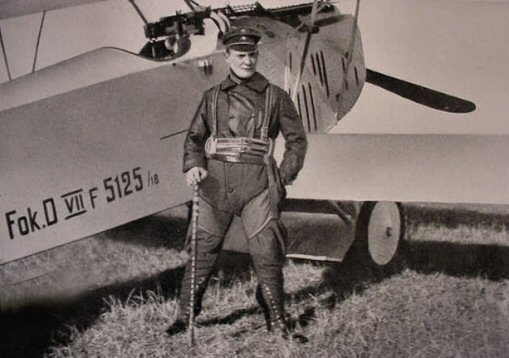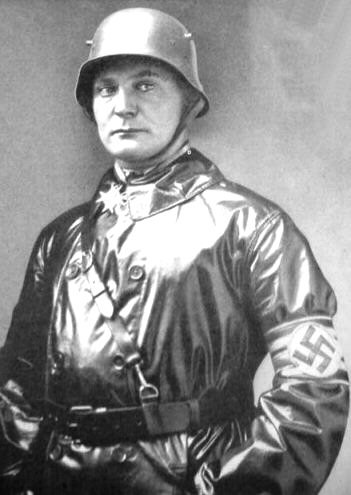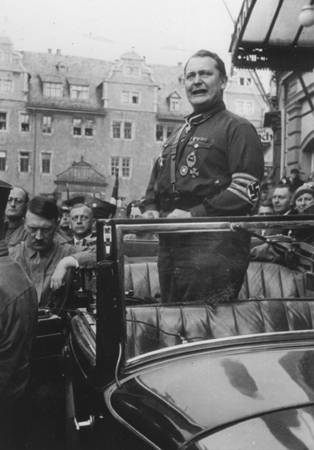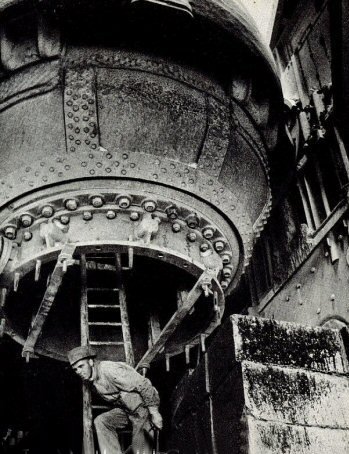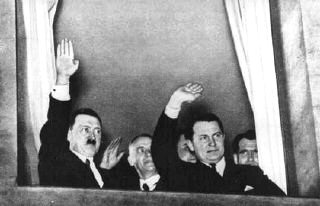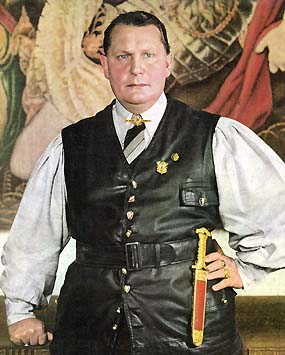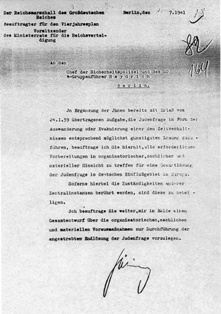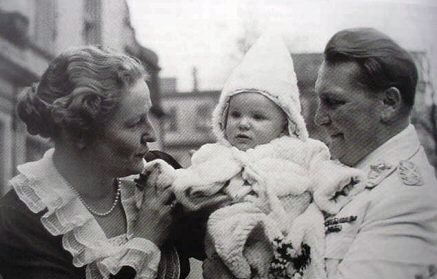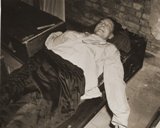Holocaust Education & Archive Research Team |
|
Holocaust Prelude Early Nazi Leaders Nazi Propaganda Nazi Racial Laws Sinti & Roma Kristallnacht The SS SS Leadership Wannsee
Prelude Articles Image Galleries
| |||||||
Hermann Göring "The Iron Knight"
Göring was born in the Marienbad sanatorium, near Rosenheim, Bavaria. His father Heinrich Ernst Göring was a former cavalry officer and member of the German consular service. Göring's mother Franziska "Fanny" Tiefenbrunn came from a Bavarian peasant family. The marriage of a gentleman to a woman from lower class occurred only because Heinrich Ernst Göring was a widower.
Goring was the only major Nazi leader with any upper class pretensions, Goring’s father had been a cavalry officer who became a senior member in the German Consular Service, ending as Consul General in Haiti.
Göring was one of five children; his brothers were Albert Göring and Karl Ernst Göring, and his sisters were Olga Therese Sophia and Paula Elisabeth Rosa Göring, the last of whom were from his father's first marriage While anti-Semitism became rampant in Germany of that time, his parents were not anti-Semitic. Goring was brought up in somewhat curious circumstances, living in one of two castles on the Austrian – Bavarian border which belonged to his mother’s lover.
Göring joined the German Army in June, 1912. He served with the infantry during the first few months of the First World War but was hospitalized with rheumatoid arthritis of the knees. After recovering, he transferred to the German Army Air Service. At first Göring was an observer for his friend and war ace, Bruno Loerzer, but eventually became a fighter pilot and scored his first victory on 16th November 1915.
After the death of Manfred von Richthofen Göring he became the leader of his JG 1 squadron. By the end of the war Göring had achieved 22 victories and had been awarded the Iron Cross and the Pour le Merite for bravery.
After the war, Göring earned his living as a pilot working for the Fokker company based in Holland. While there he met and married Baroness Karen von Fock-Kantzow. With no possessions but a Fokker demonstration aircraft he entered civil aviation in Denmark, and then in Sweden. Through connections thus made, he met Swedish Baroness Karin von Krantzow, who had divorced her husband to become Goring’s wife.
Georing was introduced to Adolf Hitler, and thereafter joined the Nazi party in 1922 and became a leader of the brown-shirted Stormtroops (Strumabteilung, hence, "Brownshirts" or SA). A member of the aristocracy, his social contacts were very valuable in selling the Nazis (the National SOCIALIST German WORKERS Party) to conservative industrialists as the only way to save Germany from the Reds!
While hospitalized for wounds taken in the Beer Hall Putch, he became morphine-addicted, a common occurrence in early 20th century medicine. Like many other "medical addicts", in an era when drugs were sold at every corner store, he kept this problem under control for many years, until World War II had begun. From the moment he joined the Party in 1922 and took command of the street-fighting organisation, the SA, Göring was the adviser, the active agent of Hitler and one of the prime leaders of the Nazi movement. As Hitler's political deputy he was largely instrumental in bringing the National Socialists to power in 1933, and was charged with consolidating this power and expanding German armed might.
He developed the Gestapo, and created the first concentration camps, relinquishing them to Himmler in 1934, conducted the Roehm purge in that year, and engineered the sordid proceedings which resulted in the removal of von Blomberg and von Fritsch from the Army.
In 1936 he became Plenipotentiary for the Four Year Plan, and in theory and in practice was the economic dictator of the Reich. Shortly after the Pact of Munich, he announced that he would embark on a five-fold expansion of the Luftwaffe. and speed rearmament with emphasis on offensive weapons.
Georing had joined the Reichstag in 1928, and subsequently became the parliament's president from 1932 to 1933, he was one of the key figures in the process of Gleichschaltung that established the Nazi dictatorship. For example, in 1933 he banned all Roman Catholic newspapers in Germany, despite the support the Centre Party had given to Hitler's chancellorship.
In 1938, he became the first Luftwaffe Field Marshal and by a decree on 19 June 1940, Hitler appointed Göring his formal successor and promoted him to the rank of Reichsmarschall, the highest military rank of the Greater German Reich. Reichsmarschall was a special rank intended for Göring and which made him senior to all Army and Air Force Field Marshals. Göring used his position to indulge in ostentatious luxury, living in a palace in Berlin and building a hunting mansion named after his first wife Karin (she had died of tuberculosis in 1931) where he organized feasts, state hunts, showed off his stolen art treasures and uninhibitedly pursued his extravagant tastes.
In 1935 he married the actress Emmy Sonnemann, their marriage was a ceremony of state to rival any royal wedding. Their daughter Edda was born in 1938 and this event gave Goring the euphoria of fatherhood.
His famous mansion of Karinhall was named after his dead wife, situated on a forest lake some fifty miles from Berlin, it became a colossal monument to Goring’s princely pride. Wing after wing was added to give his ego Lebensraum, as well as to house the works of art he bought, acquired, or shamelessly appropriated from private collections confiscated from rich Jews. His gallery displayed to the constant visitors along with his trophies from the chase, was valued eventually at £60 million pounds.
Changing uniforms and suits five times a day, affecting an archaic Germanic style of hunting dress (replete with green leather jackets, medieval peasant hats and boar spears), flouting his medals and jewellery, Göring 's transparent enjoyment of the trappings of power, his debauches and bribe-taking, gradually corrupted his judgment.
The 'Iron Knight', a curious mixture of condottiere and sybarite, 'the last Renaissance man' as he liked to style himself with characteristic egomania, increasingly confused theatrical effect with real power. Nevertheless, he remained genuinely popular with the German masses who regarded him as manly, honest and more accessible than the Fuhrer, mistaking his extrovert bluster and vitality for human warmth. Göring's cunning, brutality and ambition were displayed in the cabal he engineered against the two leading army Generals, von Fritsch and von Blomberg, whom he helped to bring down in February 1938, in the misplaced hope that he would step into their shoes. Following the Crystal Night pogrom of 9 November 1938, it was Göring who fined the German Jewish community a billion marks and ordered the elimination of Jews from the German economy, the 'Aryanization' of their property and businesses, and their exclusion from schools, resorts, parks, forests, etc.
On 12 November 1938 he warned of a 'final reckoning with the Jews' should Germany come into conflict with a foreign power. From that point on Göring zealously persecuted the Jews, and not only in Germany but in the conquered territories as well. His own utterances then and his testimony now show this interest was primarily economic "how to get their property and how to force them out of the economic life of Europe."
As these countries fell before the German army he extended the Reich's anti-Jewish laws to them; the Reichsgesetzblatt for 1939, 1940, and 1941 contains several anti-Jewish decrees signed by Göring, although their extermination was in Himmler's hands, Göring was far from disinterested or inactive, despite his later protestations in the witness box at Nuremberg.
It is important to note that it was Göring who instructed Heydrich on 31 July 1941 to 'carry out all preparations with regard to a "Final Solution" to the Jewish question in those territories of Europe which are under German influence.
This decree led to the Wannsee Conference in Jan. 1942 in which Heydrich and Adolf Eichmann of the Gestapo attempted to coordinate the extermination of the 11 million Jews of Europe and the Soviet Union.
During World War Two Goring’s vaunted air force at first enjoyed great success, but when he failed to win the Battle of Britain by attacking military and industrial targets, he authorised terror bombings on civilians, wasting not only the power of the Luftwaffe, but rousing the ire of the whole civilised world.
Goering once boasted: “The Ruhr will not be subjected to a single bomb. If an enemy bomber reaches the Ruhr my name is not Herman Goring."
The subsequent failure of the Luftwaffe at Stalingrad cost Goring his standing with Hitler and for the final two years of the war lived in semi-retirement, hunting, collecting stolen art and designing fancy uniforms and new and elaborate medals.
By 1943 the failure of the Luftwaffe on the Russian front and its inability to defend Germany itself from Allied bombing attacks underlined Göring's incompetence as its supreme commander. Undermined by Bormann's intrigues, overtaken in influence by Himmler, Goebbels and Speer, mentally humiliated by his servile dependence on the Fuhrer, Göring 's personality began to disintegrate. Near the end of the war, as the Red Army closed in around the German capital on April 23, 1945, Göring sent a telegram from Berchtesgaden to Berlin in which he proposed to assume leadership of the Reich as Hitler's designated successor. Hitler considered this disloyalty and high treason, especially because Göring mentioned a time limit after which he would consider Hitler incapacitated.
Hitler had Göring placed under arrest by Bernhard Frank on April 25 and in his political testament Hitler dismissed Göring from all his sundry offices and expelled him from the party. Two days before ending his own life Hitler sent orders to Frank to execute Göring, his wife and their young daughter.
Göring surrendered on May 9, 1945 in Bavaria. He was the third highest ranking Nazi official brought before the Nuremberg Trials, behind Reich President (former Admiral) Karl Dönitz and former Deputy Führer Rudolf Hess. During his trial Göring had been forced off drugs "cold turkey", and subsequently "slimmed down", with new renewed energy he defended himself with aggressive vigor and skill, frequently outwitting the prosecuting counsel.
With Hitler dead, he stood out among the defendants as the dominating personality, dictating attitudes to other prisoners in the dock and adopting a pose of self-conscious heroism motivated by the belief that he would be immortalized as a German martyr.
Nevertheless, Göring failed to convince the judges, who found him guilty on all four counts: of conspiracy to wage war, crimes against peace, war crimes and crimes against humanity.
Hitler's Table Talk, London, Weidenfeld and Nicolson, 1953, p. 168 The Rise and Fall of Hermann Goering. Frischauer, Willi Ballantine Books Gilbert, Gustave: "Nuremberg Diary", originally published: New York: Farrar, Straus and Company, 1947 The Holocaust Chronicle Publications International LTD USHMM
Copyright Alex Khutovsky & Carmelo Lisciotto H.E.A.R.T 2007
|
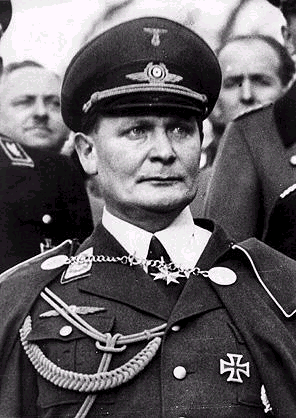 "Of course the people don't want war. But after all, it's the leaders of the country who determine the policy, and it's always a simple matter to drag the people along whether it's a democracy, a fascist dictatorship, or a parliament, or a communist dictatorship. Voice or no voice, the people can always be brought to the bidding of the leaders. That is easy. All you have to do is tell them they are being attacked, and denounce the pacifists for lack of patriotism, and exposing the country to greater danger."
"Of course the people don't want war. But after all, it's the leaders of the country who determine the policy, and it's always a simple matter to drag the people along whether it's a democracy, a fascist dictatorship, or a parliament, or a communist dictatorship. Voice or no voice, the people can always be brought to the bidding of the leaders. That is easy. All you have to do is tell them they are being attacked, and denounce the pacifists for lack of patriotism, and exposing the country to greater danger." 